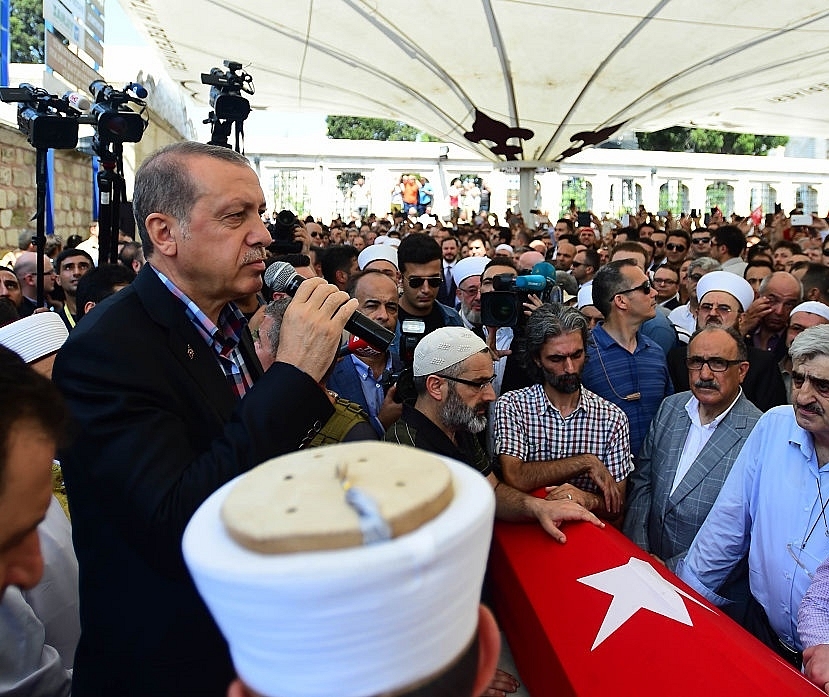World
Failed Turkish Coup Is Likely To Be A Harbinger Of More Trouble, Not Less
- A failed coup on the edges of Europe in a Muslim country that has borders with many unstable states – Syria and Iraq, among them, not to speak of semi-stable Georgia, apart from Armenia, Iran, Azerbaijan, Greece and Bulgaria – has huge implications.
- Far from preventing the next army misadventure, Erdogan’s authoritarian tendencies – already well-established before the failed coup - will end up making him a full dictator.
- With Turkey fighting a war within, and given Erdogan’s focus on internal purges, it is unlikely that Turkey will be an effective fighter against IS.

Burak Kara/Getty Images
The failed Turkish coup is a triumph of sorts for democracy,
with people rushing to the streets to stop tanks and soldiers, but the chances
are President Recep Tayyip Erdogan’s troubles may just be beginning. Worse, he
himself may stir up problems and pull defeat from the jaws of victory.
A failed coup on the edges of Europe in a Muslim country that has borders with many unstable states – Syria and Iraq, among them, not to speak of semi-stable Georgia, apart from Armenia, Iran, Azerbaijan, Greece and Bulgaria – has huge implications. Add the independence-minded Kurds, who have a problem with Turkey, and the mix is truly volatile.
Erdogan says he will “clean the virus” but an overdose of vengefulness will end up promoting vigilante justice, not democracy. Far from preventing the next army misadventure, Erdogan’s authoritarian tendencies – already well-established before the failed coup - will end up making him a full dictator. This will hardly endear himself to an embittered army.
The numbers are troubling: the coup attempt has left nearly 300 dead, and its aftermath has led to the arrest of nearly 6,000 Turks, including 2,839 soldiers, and 2,745 judges. In any coup, soldiers tend to follow their leaders, and so it is highly unlikely that so many thousands participated in the coup willingly. More worrisome, the removal of several thousand judges seems inexplicable except as an attempt to fill the lower judiciary with Erdogan loyalists.
Concerns have already been voiced by many world leaders about Erdogan’s mood of vengeance, where he has talked about reviving the death penalty. While President Obama fretted about the rough treatment meted out to the alleged plotters, French Foreign Minister Jean Marc Ayrault talked of the need for the rule of law. European Union Parliament President Martin Shulz warned Erdogan that “one-man rule and arbitrary decisions are not acceptable in a country which is not only a strategic ally, but also an accession candidate to the EU.”
The bigger concerns – not yet voiced – are also worth noting.
Second, the failed coup cannot but have given new ideas to murderous groups like the Islamic State (IS). Turkey has been targeted by IS and other jihadi groups for terrorism after Erdogan brought his country into the anti-IS alliance. IS has been losing territory following joint assaults by Iraqi and western forces. If a caliphate is to remain viable, it needs both state and territory. A guerrilla outfit can create mayhem, but it won’t be taken seriously as a caliphate. This means IS will probably look at the coup option to take over an existing state, instead of trying to retain its current territory carved out from Iraq and Syria. There is no shortage of shaky states in north Africa and West Asia, and the logical thing for IS to do is to take over one of them and assert its legitimacy.
Third, with Turkey fighting a war within, and given Erdogan’s focus on internal purges, it is unlikely that Turkey will be an effective fighter against IS. With anti-Islam sentiment rising in western Europe, especially after the solo Nice attack where Mohamed Bouhlel drove a truck repeatedly into crowds and killed 84, Islamophobia is gaining ground. Across the Atlantic, Donald Trump is also beating the anti-Islam drum. This is exactly what suits Islamist forces everywhere. Even if Islamic State is defeated on the battlefield, its idea will be self-franchised by many freelance jihadi groups. The west appears to be playing into IS hands.
Fourth, rising
race tensions in the US, which led to the killings of five police officers by
Afro-Americans in Dallas 10 days ago, and three more in Baton Rouge, Louisiana,
two days ago, provide fertile grounds for extremism. This is just the kind of
opening Islamic State needs to land in America. The Afro-American who killed police
officers in Baton Rouge, Gavin Eugene Long, apparently belonged to Nation of
Islam, a radical black rights group. Is it a stretch to see Islamists fighting
a foothold in America?
Make no mistake. The Turkish failed coup set the stage for more global political, ethnic and religious tensions, with the most powerful nationals in the world unable to deal with it sensibly.
The old world order is crumbling, and Islamism is trying to fill the gap. Xenophobic and autocratic forces are likely to get their day in the sun as the world slides into a degree of chaos.
Introducing ElectionsHQ + 50 Ground Reports Project
The 2024 elections might seem easy to guess, but there are some important questions that shouldn't be missed.
Do freebies still sway voters? Do people prioritise infrastructure when voting? How will Punjab vote?
The answers to these questions provide great insights into where we, as a country, are headed in the years to come.
Swarajya is starting a project with an aim to do 50 solid ground stories and a smart commentary service on WhatsApp, a one-of-a-kind. We'd love your support during this election season.
Click below to contribute.
Latest